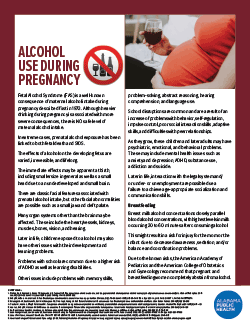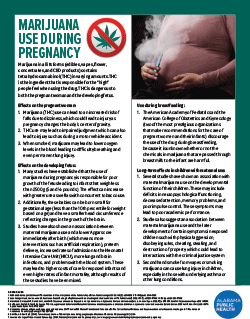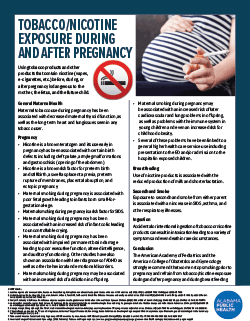- Perinatal Program Home
- News and Events
- Annual Progress Report
- Breastfeeding
- Alabama Maternal Mortality Review Program
- Alabama Fetal and Infant Mortality Review Program
- Infant Mortality
- Perinatal Partners
- Perinatal Regionalization
- Pregnancy Resources
- Preparing for Disaster
- Perinatal Regions and Coordinators
- Related Links
- RPAC Members
- Safe Sleep
- Cribs for Kids® - Alabama
- SPAC Members
- State of Alabama Infant Mortality Reduction Plan
- Contact Us
Pregnancy Resources
Folic Acid
Folic Acid is a B vitamin that is an essential nutrient for healthy growth and development. The U.S. Public Health Service and the Centers for Disease Control and Prevention recommend that all women of childbearing age take 400 micrograms of folic acid every day to help prevent major birth defects of the baby's brain and spine known as neural tube defects (NTDs).
About 3,000 pregnancies are affected by NTDs each year in the U.S. It is estimated if women took folic acid every day before getting pregnant and during early pregnancy, it may help reduce the number of pregnancies affected by NTDs by up to 70 percent.
NTDs are detected through an alpha-fetoprotein test (AFP). AFP is a blood test administered at 16-18 weeks of pregnancy. The test measures alpha-fetoprotein, a substance produced by the fetus and secreted into the amniotic fluid. An elevated AFP can mean the mother is carrying twins or that there is a problem with the placenta. An elevated AFP can also mean that there is the possibility of birth defects present such as kidney or liver disease, Down syndrome, spina bifida, or other defects. Additional follow-up and testing will be conducted by the healthcare provider if an elevated AFP is detected.
Foods that contain folic acid include:
- Beans, like lentils, pinto beans, and black beans
- Leafy green vegetables, like spinach and Romaine lettuce
- Asparagus
- Broccoli
- Peanuts
- Citrus fruits, like oranges and grapefruit
- Enriched or fortified grains, cereals, and pasta
Additional resources:
- Centers for Disease Control and Prevention
- March of Dimes
- American Pregnancy Association
- Facts About Folic Acid
Fetal Alcohol Spectrum Disorders (FASD)
The National Organization on Fetal Alcohol Syndrome is a federal initiative devoted to preventing and treating FASD. FASD comprises a range of effects that can occur in an individual whose mother drank alcohol during pregnancy.
Count the Kicks
A baby's movements are an important sign of their well-being in the 3rd trimester. Get to know what's normal for your baby using the free Count the Kicks Pregnancy App.
Neonatal Abstinence Syndrome (NAS)
- What is Neonatal Abstinence Syndrome? Available as a download through the Office of Women's Health.
- What is NAS? (March of Dimes)
Oral Health During Pregnancy
Getting healthy before pregnancy and staying healthy throughout is an important priority for expectant moms. And oral health is a vital part of overall health and well-being. Unfortunately, oral health issues can be common during pregnancy. And more than half of women report not seeing a dental professional during pregnancy. Up to 70% of pregnant women experience gingivitis associated with changes in hormone levels during pregnancy. Some studies indicate there may be an association between poor maternal oral health and preterm birth. To learn more go to Dental Care or Brushing for Two: How Your Oral Health Affects Baby.
Postpartum Depression
- Substance Abuse and Mental Health Services Administration (SAMHSA) Depression Toolkit - Many mothers struggle daily with depression. Depression is a real condition that can affect mood, appetite, and health. This toolkit is designed for community-based providers to offer ideas and resources for helping mothers, and their families, who may be suffering from depression.
- Jenny's Light was established with the mission to improve and save lives by increasing awareness of perinatal mood disorders such as postpartum depression.
- Postpartum Support, International is dedicated to helping women suffering from perinatal mood and anxiety disorders, including postpartum depression. They also work to educate family, friends, and healthcare providers so that moms and moms-to-be can get the support they need and recover.
- PostpartumDepression.org is a community website sharing the stories of women and men who have experienced postpartum depression (PPD).
Pre-Pregnancy and Prenatal Care
Pre-Pregnancy and prenatal care can help prevent complications and inform women about important steps they can take to protect their infant and ensure a healthy pregnancy. With regular prenatal care, women can reduce the risk of pregnancy complications. For more information, read Prenatal Care Checkups from the March of Dimes.
Page last updated: February 4, 2026







